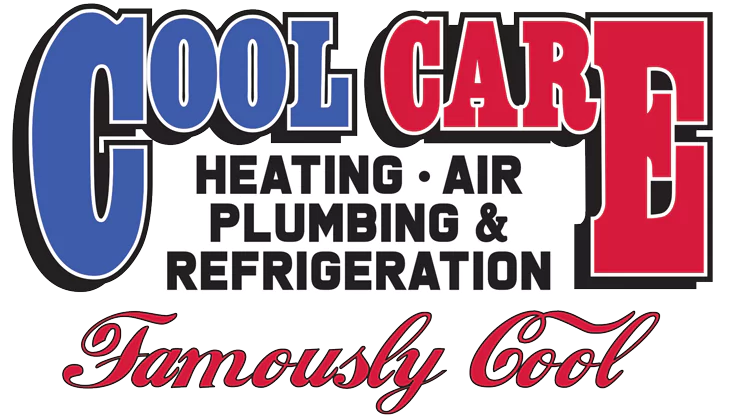Water Heaters
Residential Water Heaters
Your water heater is one of the most important and hardest working appliances you have in your home. As a result, you will want the best contractor around to handle your water heater services. Cool Care Heating, Air, Plumbing & Refrigeration provides the best in water heater installations, water heater maintenance and more.
Water Heater Installation
Are you in the market for a new water heater for your home? If so, there are quite a few options to consider, each with their own unique benefits. The good news is that our experts here at Cool Care Heating, Air, Plumbing & Refrigeration are here to assist you in making an educated decision. We will start by informing you of your choices – the first one being whether you want a standard storage tank water heater or a tankless model. Do not worry if you are unsure which is right for you. Our staff has extensive experience with water heater installation services and will guide you on the best option to meet your needs.
Here are the major differences between tank and tankless water heaters:
Tank Water Heaters
These systems are still the most widely used type of water heaters. They are designed around a large, cylindrical storage tank that holds and heats water on a consistent basis that is ready for on-demand usage. These types of water heaters are sturdy and very rarely need repairs; however, despite their numerous benefits, they are not as efficient as the newer types of water heaters on the market today.
The traditional storage tank water heater is more affordable upfront for installation. Chances are that the connections for a tank water heater are already in place in your home making the process of installation or replacement that much easier.
Another advantage of the traditional tank water heater is that it guarantees instant hot water for up to an hour throughout your home once you turn on the tap or appliance that demands it.
Tankless Water Heaters
Tankless water heater installation can be an easier process since they do not take up as much space in your home as tank water heaters. Additionally, they do not rely on a storage tank to heat your water. Instead, they depend on a heat exchanger that warms the water on its way to the destination. These systems turn on only when needed and turn off as soon as you turn off the hot water tap, which makes them far more energy efficient than their storage tank counterparts; however, there is a noticeable delay in the hot water arriving at the faucet.
Though they cost more than their traditional counterparts to install, they are more efficient – and therefore more cost-effective – in the long run. Since they do not fill a tank with water to be heated continuously throughout the day, you are only paying for the hot water you use. Unlike traditional water heaters, tankless water heaters deliver as much hot water as you want whenever you need it, and they do not waste energy heating water you cannot use. This can reduce your energy bills by as much as 35%, in most cases. Maintenance is also typically easier with a tankless water heater than the storage tank model.
Tankless water heaters consume less energy than traditional water heaters and require considerably less space. Rinnai water heaters are state-of-the-art units that are as small as a carry-on suitcase and can be mounted on an indoor or outdoor wall.
There are many advantages with both types of water heaters. When the time does come for you to choose between the two for installation in your home, make sure that you consider all the factors. It is important to think about your budget, how much hot water you will want access to daily, and how much you are willing to pay for hot water month-to-month. Consider your upfront budget in addition to your long-term budget to decide which water heater will work better for you.
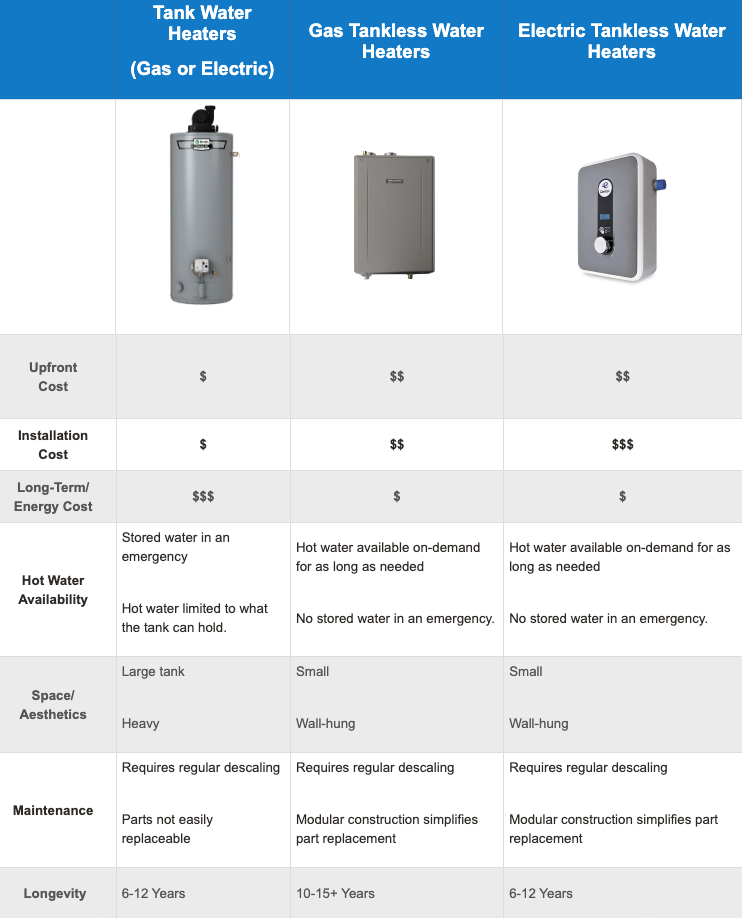
Water Heater Repair
Water heaters generally last from six to twelve years and can consume up to 25% of your monthly energy costs, and as they age and become less efficient, their energy consumption increases. Older water heaters often develop corrosion and rust, and when this becomes severe, water can begin to leak from the tank. If rust and corrosion are present, it is time for a new water heater unit. Left untreated, rust and corrosion can cause serious leaks that result in indoor flooding.
Leaks can occur if the water heater temperature is set too high. An overly high temperature setting creates excessive pressure within the tank, and water will leak from the unit to reduce the pressure. High water pressure leaks can appear if the home’s exterior water supply enters the house at too high of a pressure. Leaks can also develop if the temperature pressure relief valve is defective.
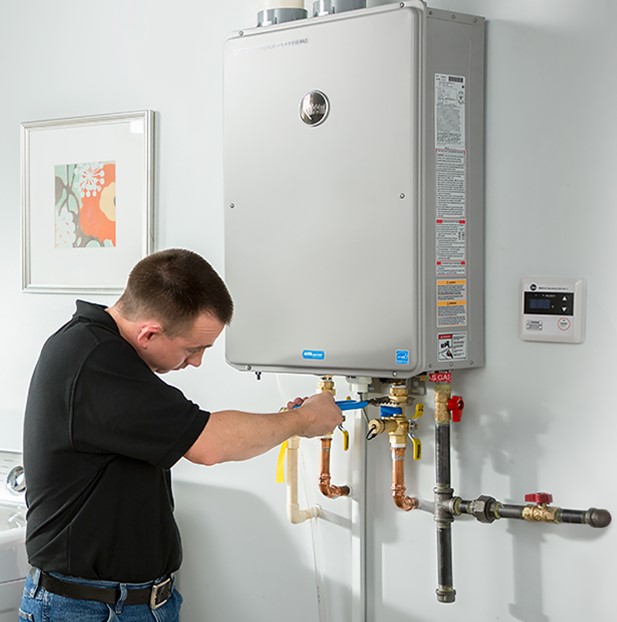
Water Heater Maintenance
Accurate installation is just the beginning when it comes to quality water heater service. To ensure your water heater’s longevity, be sure to schedule maintenance annually. This allows our team to catch problems before they become much larger and potentially more expensive, but when a problem occurs between maintenance appointments, you can trust us to limit the damage.
When water heaters heat water, minerals can collect on the sides, the tank and on the burner. As the unit ages, these minerals can accumulate inside the tank. Unless they are flushed out, they can create a sediment barrier that coats the burner and diminishes performance. This can mean less hot water and higher utility bills. Guard against sediment buildup by having the unit inspected and by scheduling water filtration service annually.
The burner of a gas hot water heater should be checked periodically as well. The flame should burn blue with a yellow tip. If the flame is a yellow-orange color, have the unit serviced immediately. A yellow-orange flame indicates incomplete burning, which can cause poor water heating and potentially release carbon monoxide gas.
If you need to have a water heater installed or serviced, give us a call at 803.772.7715 to schedule an appointment with one of our expert technicians.
Water Heaters
Commercial Water Heaters
A water heater that suddenly fails can cause widespread, immediate problems in your building. It is best to become familiar with your current water heater’s age. If your water heater is ten years old or older, it is a good idea to be proactive and replace it.
When you have a new unit installed, schedule regular maintenance for it. There are specific parts in a water heater that will wear out over time. Water causes rust in all metals, and parts of your water heater will be coming in constant contact with water.
Water Heater Installation
Are you in the market for a new water heater for your business? If so, there are quite a few options to consider, each with their own unique benefits. The good news is that our experts here at Cool Care Heating, Air, Plumbing & Refrigeration are here to assist you in making an educated decision. We will start by informing you of your choices – the first one being whether you want a standard storage tank water heater or a tankless model. Do not worry if you are unsure which is right for you. Our staff has extensive experience with water heater installation and will guide you on the best option to meet your business’s needs. Here are the major differences between tank and tankless water heaters:
Tank Water Heaters
These systems are still the most widely used type of water heaters. They are designed around a large, cylindrical storage tank that holds and heats water on a consistent basis that is ready for on-demand usage. These types of water heaters are sturdy and very rarely need repairs; however, despite their numerous benefits, they are not as efficient as the newer types of water heaters on the market today.
The traditional storage tank water heater has numerous benefits. Keeping its standing as the most widely used water heater model, it is more affordable upfront for installation. Chances are that the connections for a tank water heater are already in place in your office making the process of installation or replacement that much easier.
Another advantage of the traditional tank water heater is that it guarantees instant hot water for up to an hour throughout your building once you turn on the tap or appliance that demands it.
Tankless Water Heaters
Tankless water heater installation can be an easier process since they do not take up as much space in your office as tank water heaters. Additionally, they do not rely on a storage tank to heat your water. Instead, they depend on a heat exchanger that warms the water on its way to the destination. These systems turn on only when needed and turn off as soon as you turn off the hot water tap, which makes them far more energy efficient than their storage tank counterparts; however, there is a noticeable delay in the hot water arriving at the faucet.
Though they cost more than their traditional counterparts to install, they are more efficient – and therefore more cost-effective – in the long run. Since they do not fill a tank with water to be heated continuously throughout the day, you are only paying for the hot water you use. Unlike traditional water heaters, tankless water heaters deliver as much hot water as you want whenever you need it, and they do not waste energy heating water you cannot use. This can reduce your energy bills by as much as 35%, in most cases. Maintenance is also typically easier with a tankless water heater than the storage tank model.
Tankless water heaters consume less energy than traditional water heaters and require considerably less space. Rinnai water heaters are state-of-the-art units that are as small as a carry-on suitcase and can be mounted on an indoor or outdoor wall.
There are many advantages with both types of water heaters. When the time does come for you to choose between the two for installation in your business, make sure that you consider all the factors. It is important to think about your budget, how much hot water you will want access to daily, and how much you are willing to pay for hot water month-to-month. Consider your upfront budget in addition to your long-term budget to decide which water heater will work better for you.
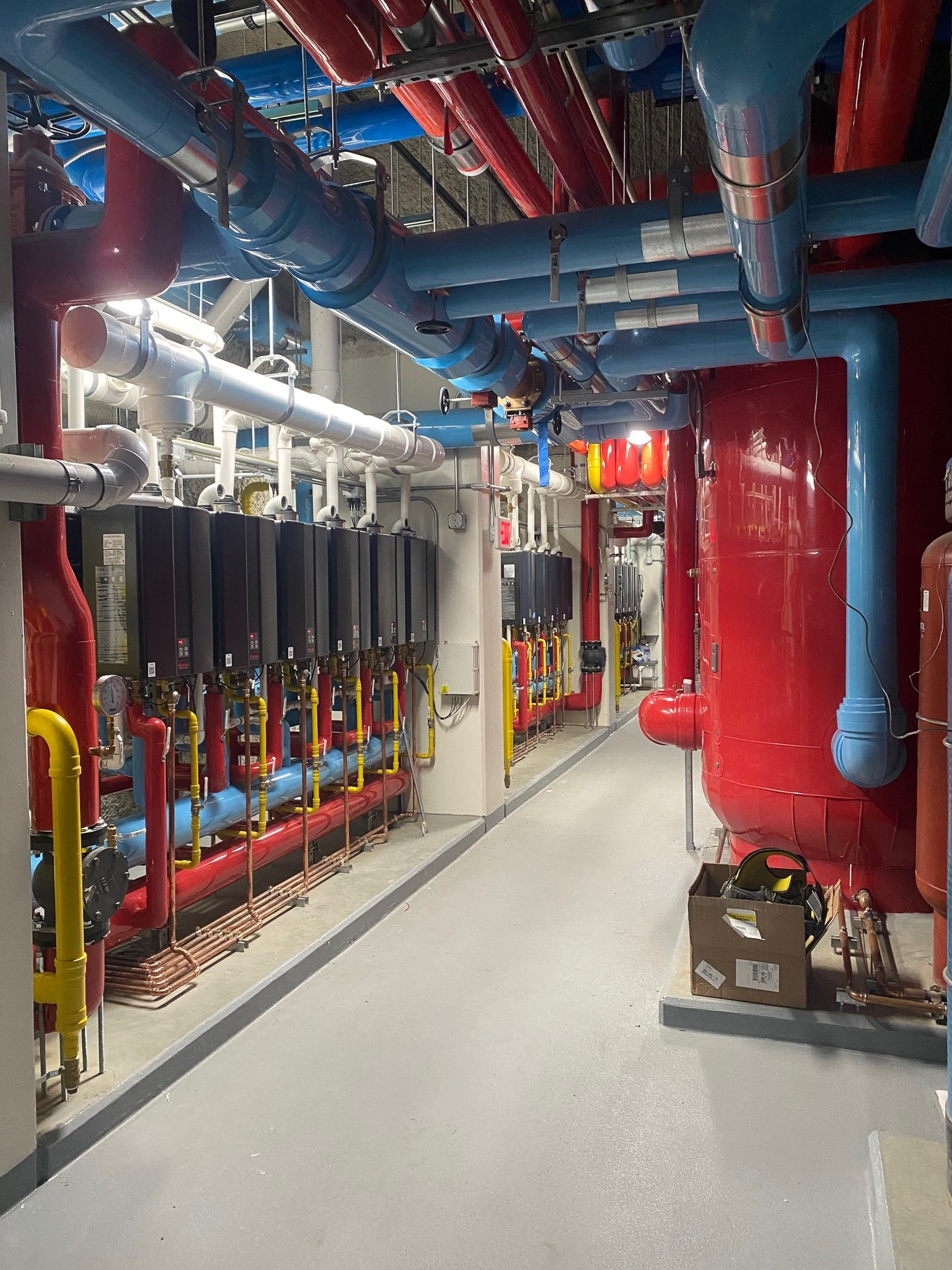
Water Heater Repair
Hot water heaters generally last from eight to twelve years. Water heaters can consume up to 25% of your monthly energy costs, and as they age and become less efficient, their energy consumption increases. Older hot water heaters often develop corrosion and rust, and when this becomes severe, water can begin to leak from the tank. If rust and corrosion are present, it is time for a new water heater unit. Left untreated, rust and corrosion can cause serious leaks that result in indoor flooding.
Leaks can occur if the water heater temperature is set too high. An overly high temperature setting creates excessive pressure within the tank, and water will leak from the unit to reduce the pressure. High water pressure leaks can appear if the home’s exterior water supply enters the house at too high of a pressure. Leaks can also develop if the temperature pressure relief valve is defective.
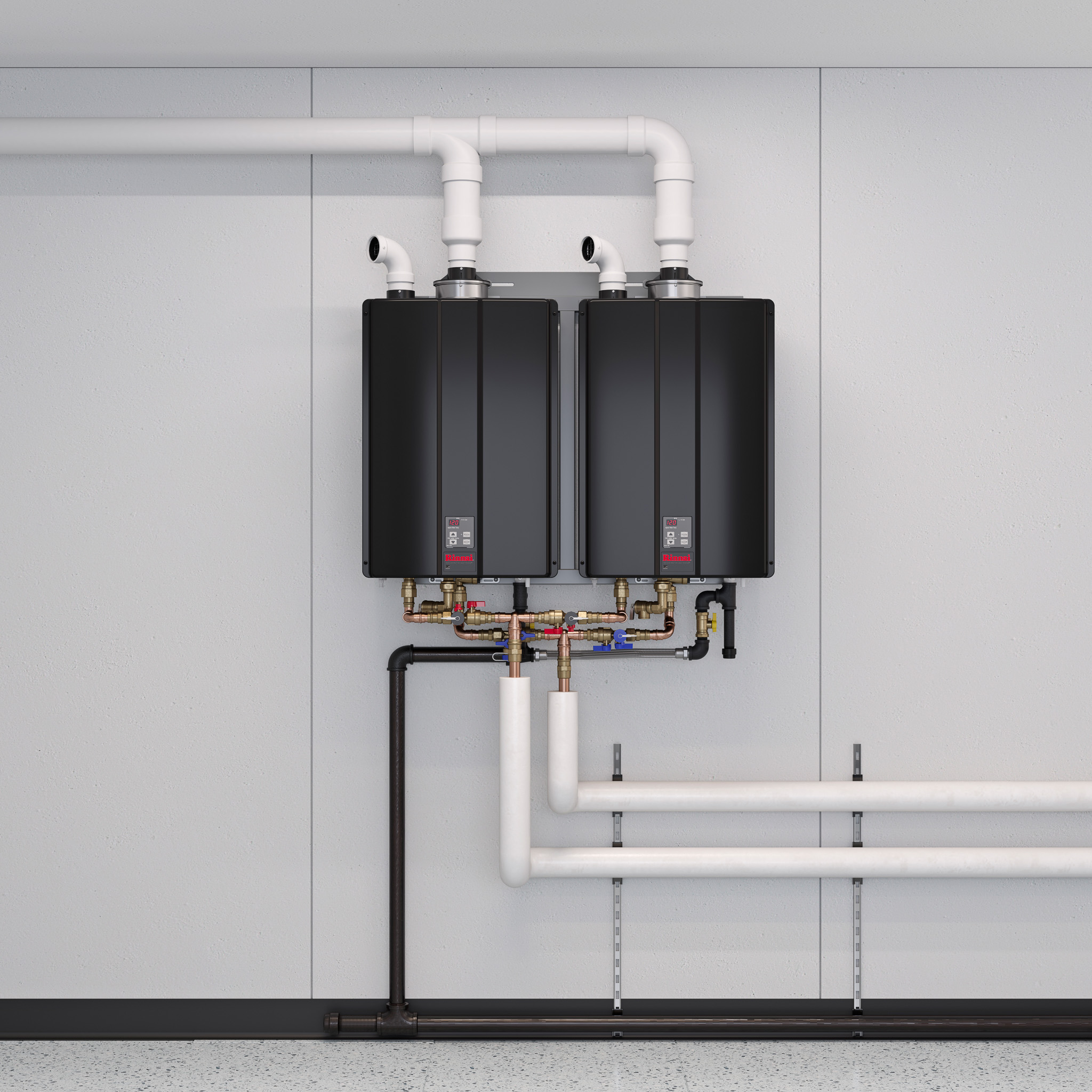
Water Heater Maintenance
Accurate installation is just the beginning when it comes to quality water heater service. To ensure your water heater’s longevity, be sure to schedule maintenance annually. This allows our team to catch problems before they become much larger and potentially more expensive, but when a problem occurs between maintenance appointments, you can trust us to limit the damage.
When water heaters heat water, minerals can collect on the sides, the tank and on the burner. As the unit ages, these minerals can accumulate inside the tank. Unless they are flushed out, they can create a sediment barrier that coats the burner and diminishes performance. This can mean less hot water and higher utility bills. Guard against sediment buildup by having the unit inspected and by scheduling water filtration service annually.
The burner of a gas hot water heater should be checked periodically as well. The flame should burn blue with a yellow tip. If the flame is a yellow-orange color, have the unit serviced immediately. A yellow-orange flame indicates incomplete burning, which can cause poor water heating and potentially release carbon monoxide gas.
